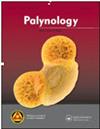美国古新世-始新世边界具有生物地层学意义的孢粉植物
IF 1.3
4区 地球科学
Q3 PALEONTOLOGY
引用次数: 2
摘要
摘要研究了美国怀俄明州西北部大角盆地(Bighorn Basin, BHB)古新世Fort Union组和古新世-始新世Willwood组的花粉和孢子。在BHB的许多局部地层剖面中,始新世的基底被特征负碳同位素偏移(CIE)所识别,标志着古新世-始新世极热期(PETM)的开始。利用光镜和扫描电镜对露头孢粉类群进行了研究。正式描述了7个新种(vegrandis Tricolpites、Rousea spatium、Striatricolporites astutus、Striatopollis calidarius、Friedrichipollis geminus、Retistephanocolporites modicrassus和Retistephanocolporites pergrandis)。这些孢粉植物的时间和地理分布表明,在PETM期间,炎热和季节性干燥的气候促进了它们从美国热带或亚热带向北转移。对于温带孢粉植物,炎热和季节性干燥的环境导致了局部灭绝。对古新世-始新世界线所建立的孢粉地层方案的重新评价证实,Platycarya platycaryoides的首次出现代表了落基山脉地区古新世-始新世界线。与早期Wasatchian (Wa) Wa-0和Wa- r动物群相关的一个新的Striatopollis calidarius亚带也被认为是BHB的CIE体位。本文章由计算机程序翻译,如有差异,请以英文原文为准。
Biostratigraphically Significant Palynofloras from the Paleocene–Eocene Boundary of the USA
ABSTRACT Pollen and spores were recovered from the Paleocene Fort Union Formation and Paleocene–Eocene Willwood Formation of the Bighorn Basin (BHB), northwestern Wyoming, USA. In many local stratigraphic sections in the BHB, the base of the Eocene has been identified by the characteristic negative carbon isotope excursion (CIE) that marks the beginning of the Paleocene–Eocene Thermal Maximum (PETM). The palynotaxa from outcrop samples were examined using light microscopy (LM) and scanning electron microscopy (SEM). Seven new species are formally described (Tricolpites vegrandis, Rousea spatium, Striatricolporites astutus, Striatopollis calidarius, Friedrichipollis geminus, Retistephanocolporites modicrassus and Retistephanocolporites pergrandis). The temporal and geographic distributions of many of these palynotaxa suggest that hotter and more seasonally dry climates facilitated their northward range shifts during the PETM from the tropics or subtropics of the USA. For the temperate palynotaxa, the hotter and seasonally dry conditions resulted in local extirpation. A reevaluation of the palynostratigraphic schemes established for the Paleocene–Eocene boundary confirms that the first appearance of Platycarya platycaryoides denotes the Paleocene–Eocene boundary in the Rocky Mountains region. A new Striatopollis calidarius Subzone, associated with early Wasatchian (Wa) Wa-0 and Wa-R faunas, is also recognized for CIE body localities in the BHB.
求助全文
通过发布文献求助,成功后即可免费获取论文全文。
去求助
来源期刊

Palynology
地学-古生物学
CiteScore
3.40
自引率
26.70%
发文量
48
审稿时长
>12 weeks
期刊介绍:
Palynology is an international journal, and covers all aspects of the science. We accept papers on both pre-Quaternary and Quaternary palynology and palaeobotany. Contributions on novel uses of palynology, review articles, book reviews, taxonomic studies and papers on methodology are all actively encouraged.
 求助内容:
求助内容: 应助结果提醒方式:
应助结果提醒方式:


